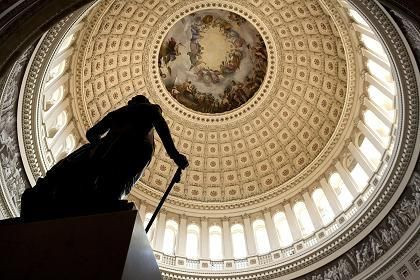Sequester Cuts 2013: Rival Spending Plans Head For Senate Vote

The U.S. Senate is expected to vote Thursday on rival plans that seek to avert the 2013 sequester poised to take effect Friday at midnight.
The competing measures – put forward by Majority Leader Harry Reid, D-Nev., and Minority Leader Mitch McConnell, R-Ky. – will need 60 votes to pass procedural hurdles. Both are believed to be dead on arrival, and some compromise will be necessary if the sequester is to be averted.
Otherwise, some $85 billion in spending cuts will kick in this year, split evenly between military and domestic programs. Both sides seem set on letting sequestration occur, if even on a temporary basis, as President Barack Obama has retreated from public campaigning and invited congressional leaders to meet for the first time regarding the matter on Friday, when the sequester will have already taken effect.
While leaders negotiate a possible compromise, the intention of the Democrats' $110 billion alternative plan is to put off the sequester for the remainder of 2013. It includes a mixture of spending cuts and new tax revenue. Reid’s proposal would eliminate agricultural subsidies and remove corporate tax breaks. As far as taxes go, the Democrats are looking to apply the “Buffet Rule”: a 30 percent minimum tax on millionaires.
“It would avoid harmful cuts that will hurt American families, harm military readiness and hinder our economic recovery,” Reid said earlier this week in the Senate.
“Unfortunately, Republicans would rather let devastating cuts go into effect than close a single wasteful tax loophole,” he later continued. “They would rather cut Medicare, education and medical research than ask a single millionaire to pay a single dollar more in taxes. ... Once again, the only Republicans rejecting a reasonable, balanced compromise are Republicans in this building – Republicans in Congress.”
Tax increases remain a non-starter for Republicans who have publicly stated that the party has moved twice to offset the sequestration and will not act another time before the Senate makes a move. The previous measures, passed in the 112th Congress, will need to pass again in the House before they are considered in the Senate.
A proposal sponsored by McConnell will keep the $85 billion in spending cuts in place, but give the president leeway on how to spread them across the different programs.
“Look, the choice we face isn’t between the sequester and tax hikes,” McConnell said Tuesday on the Senate floor. “Remember, we’re only talking about cutting 2 to 3 percent of the budget. Any business owner or middle-class parent will tell you it’s completely ridiculous to think Washington can’t find a better way to cut 2 or 3 percent of the federal budget at a time when we’re $16 trillion in debt.
“Every single working American had to figure out how to make ends meet with 2 percent less in their paychecks last month when the payroll tax holiday expired,” he continued. “Are you telling me Washington can’t do the same? It’s absurd. There’s no reason in the world these cuts need to fall on essential services or emergency responders. ... Enough.”
White House spokesman Jay Carney dismissed the Republican plan on Monday, saying the flexibility offered to Obama -- which would also make the president take the heat for specific cuts -- “might help you on the margins.”
“The size of the cuts and the fact that they all have to be done in such a short period of time, the fact that they’re limited where they are in portions of defense and nondefense discretionary, means that the impacts cannot be avoided,” he said.
Carney called the sequester cuts “real effects on real people’s lives” and called on the Senate to pass a bill to prevent the harmful effects.
© Copyright IBTimes 2024. All rights reserved.






















